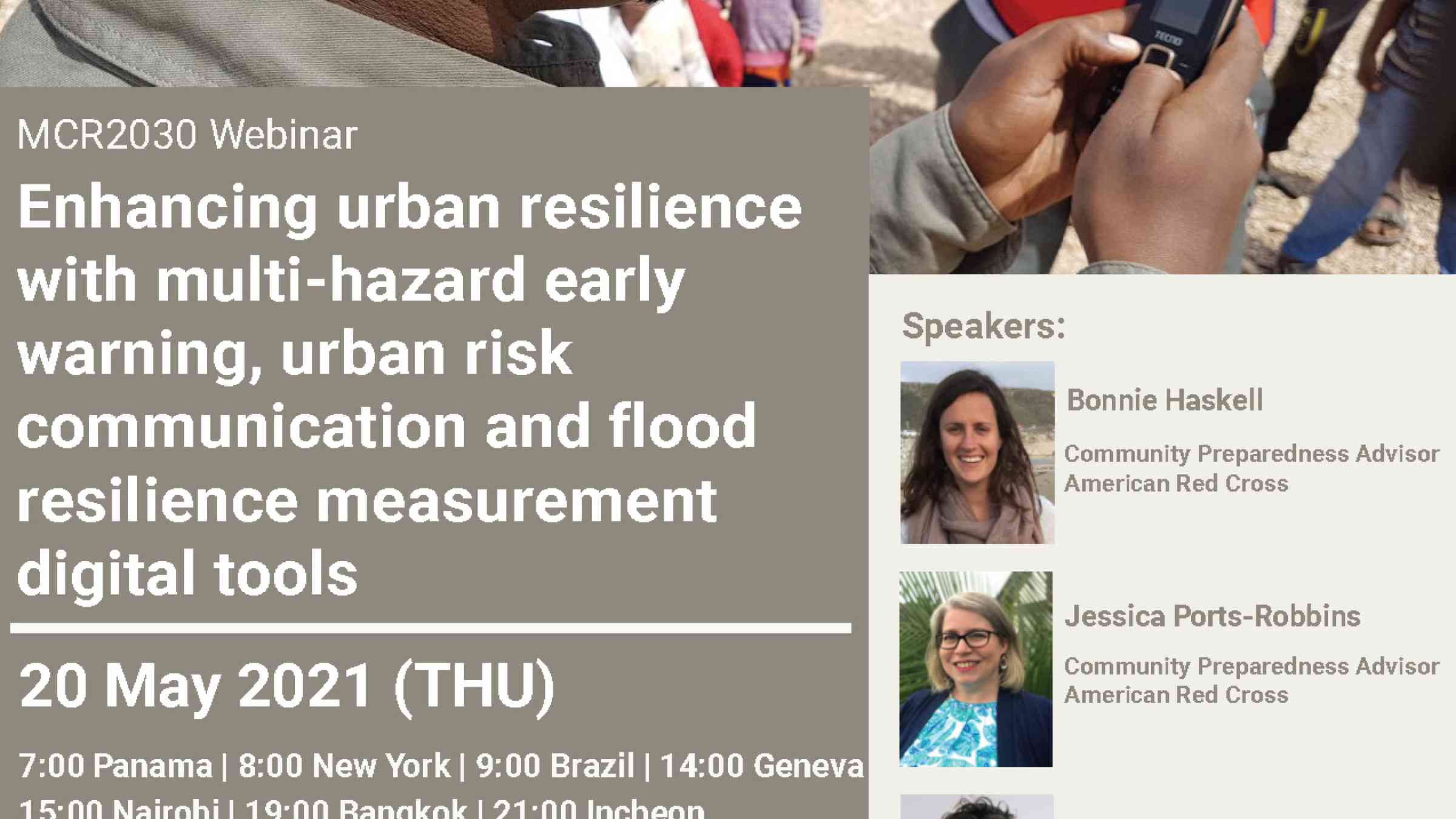[MCR2030-UNDRR-IFRC] Enhancing urban resilience with multi-hazard early warning, urban risk communication and flood resilience measurement digital tools

- English
Webinar Description
This webinar aims to present the three tools developed and supported by the IFRC and its partners and how they can be used in strengthening urban resilience:
- IFRC Alert Hub Initiative aims to protect lives and livelihoods by increasing the use of the Common Alerting Protocol (CAP), which is a standard ITU format to issue multi-hazard early warning alerts communicating key facts of an emergency. The IFRC is developing a free online platform that aggregates all published CAP alerts from official authorities worldwide.
- WhatNow Service is a global platform of the Red Cross Red Crescent to disseminate localized actionable messages on how people can safely prepare for and respond to local hazards. These key messages are nationally adapted and especially relevant to urban context. These messages can be linked to CAP alerts for alerting authorities share RCRC ‘what to do now’ messages with the public when a hazard hits.
- Flood Resilience Measurement for Communities comprises two parts: a) the Alliance’s framework for measuring community flood resilience; and b) an associated web-based tool for implementing the framework in practice.
These tools are open to cities and stakeholders who are interested in taking the MCR2030 journey.
A total of 521 participants from 98 countries/territories attended this webinar and were highly engaged in exchanging with speakers on the tools and how to collaborate with IFRC. Please view the video recording to learn more about these tools.
Organizers
- United Nations Office for Disaster Risk Reduction (UNDRR) Global Education and Training Institute (GETI)
- International Federation of Red Cross and Red Crescent Societies (IFRC)
- Making Cities Resilient 2030 (MCR2030)
About the International Federation of Red Cross and Red Crescent Societies (IFRC):
The IFRC is the world's largest humanitarian network that reaches 150 million people in 192 National Societies through the work of over 13,7 million volunteers.
Together, we act before, during and after disasters and health emergencies to meet the needs and improve the lives of vulnerable people. We do so without discrimination as to nationality, race, religious beliefs, class or political opinions.
Guided by Strategy 2020 – our collective plan of action to tackle the major humanitarian and development challenges of this decade – we are committed, in this fast-changing world, to ‘saving lives and changing minds’.
Our strength is in our volunteer network, our community-based expertise and our ability to give a global voice to vulnerable people. By improving humanitarian standards, working as partners in development, responding to disasters, supporting healthier and safer communities, we help reduce vulnerabilities, strengthen resilience and foster a culture of peace around the world.
Visit www.ifrc.org for more information.
About the UNDRR Global Education and Training Institute (UNDRR GETI):
UNDRR GETI was established in 2010 to develop a new cadre of professionals in disaster risk reduction and climate change adaptation to build disaster resilient societies.
GETI has a global mandate to provide capacity building support to mainstream disaster risk reduction and climate change adaptation into sustainable development; convene and support inter-city learning to strengthen resilience (Making Cities Resilient); and to provide capacity building and best practice sharing support to national training institutions working on resilience issues.
Based in Incheon, the Republic of Korea, UNDRR GETI is also a global secretariat of the Making Cities Resilient 2030 (MCR2030).
About the Making Cities Resilient 2030 (MCR2030):
Making Cities Resilient 2030 (MCR2030) is a unique cross-stakeholder initiative for improving local resilience through advocacy, sharing knowledge and experiences, establishing mutually reinforcing city-to-city learning networks, injecting technical expertise, connecting multiple layers of government and building partnerships.
Through delivering a clear 3-stage roadmap to urban resilience, providing tools, access to knowledge and monitoring and reporting tools, MCR2030 will support cities on their journey to reduce risk and build resilience.
MCR2030 aims to ensure cities become inclusive, safe, resilient and sustainable by 2030, contributing directly to the achievement of Sustainable Development Goal 11 (SDG11) “Make cities and human settlements inclusive, safe, resilient and sustainable”, and other global frameworks including the Sendai Framework for Disaster Risk Reduction, the Paris Agreement and the New Urban Agenda.
Visit mcr2030.undrr.org for more information.
Date & Time
Date: 20 May 2021 (Thu)
Time: 7:00 Panama | 8:00 New York | 9:00 Brazil | 14:00 Geneva | 15:00 Nairobi | 19:00 Bangkok | 21:00 Incheon
Duration: 1.5 hours
Language: English, with simultaneous interpretation in Spanish
For more information:
UNDRR Global Education and Training Institute (GETI) at undrr-incheon@un.org
Chang Hun Choe, DRR and Resilience Coordinator, IFRC at ch.choe@ifrc.org